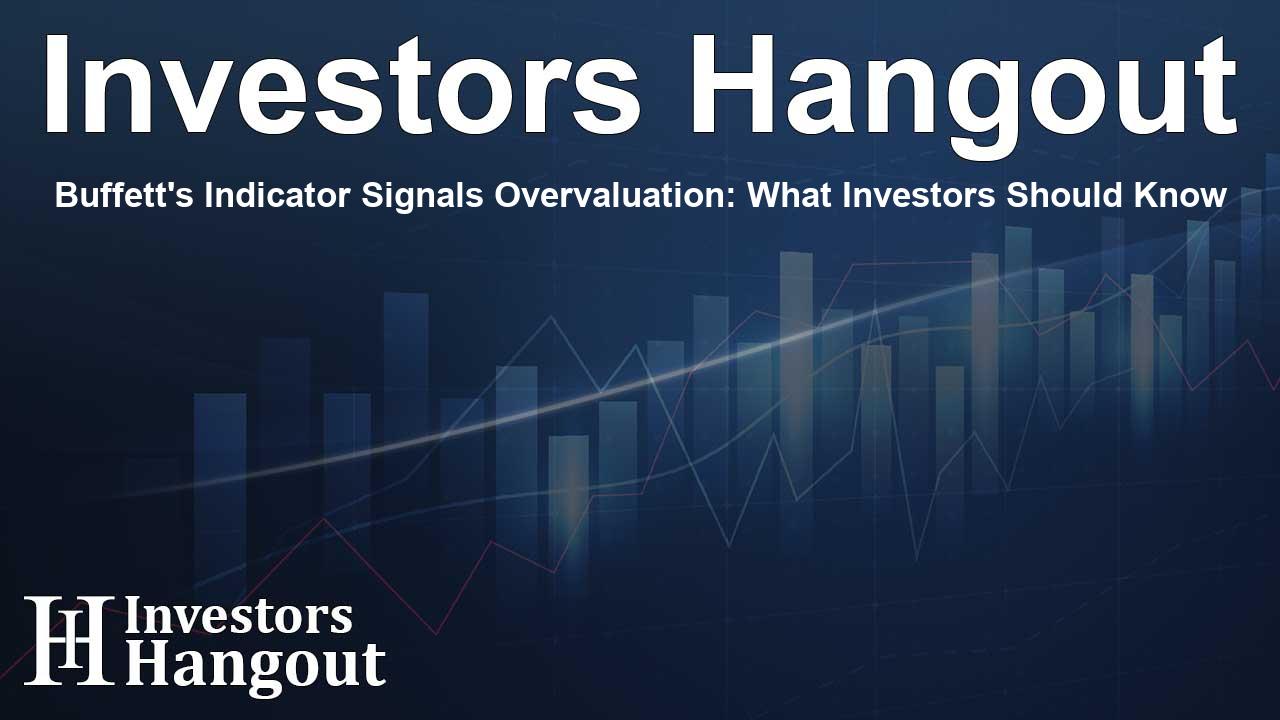Buffett's Indicator Signals Overvaluation: What Investors Should Know

Warren Buffett's Indicator Reaches Alarming Levels
The Warren Buffett Indicator, a crucial gauge of the valuation of the U.S. stock market, has recently surged to a level that Buffett himself has warned could be akin to 'playing with fire.' This comparison has raised alarms among investors who are closely watching the market's trends.
Understanding the Current Market Valuation
The Warren Buffett Indicator calculates the total value of the U.S. stock market in relation to the country's economic output. Recent reports show this indicator has soared over 200%, indicating a concerning trend of inflated valuations compared to economic growth. The current ratio stands at approximately 217%, revealing a stark contrast to historical norms.
This increase has been largely fueled by the ongoing excitement surrounding artificial intelligence and strong performances from major companies. The overall market value of U.S. stocks has reached about 363% of GDP, exceeding even the 212% peak recorded during the infamous dot-com bubble.
Why This Matters for Investors
According to market analysts like JPMorgan's David Kelly, the significant gains seen since the mid-1980s can be traced back to higher profit margins and increased market multiples. This raises concerns that the current valuations may be built on shaky ground. The overreliance on multiple expansions rather than sustainable earnings growth suggests potential instability ahead.
Buffett has often referred to this indicator as 'probably the best single measure' of market valuation available. With the latest data suggesting that stock prices are outpacing economic growth, the risks associated with future earnings and growth appear to be intensifying.
Concerns Over Future Market Performance
The implications of these findings indicate that, as valuations begin to contract or economic growth slows, investors could face reduced returns. This aligns with Buffett's investment philosophy that emphasizes the need for value investing and maintaining a margin of safety.
Many investors are beginning to worry about the sustainability of the AI boom, especially after the disappointing launch of GPT-5 and a recent market correction that wiped out approximately $1 trillion in value from leading tech stocks. This situation is creating skepticism about the value of current market leaders and the overall health of the stock market.
The Shift Towards Diversification
In light of these challenges, strategists suggest diversifying investments into international equities, stable bonds, and alternative asset classes. This shift is becoming more critical as U.S. economic growth shows signs of slowing down.
Furthermore, concerns are growing regarding the concentration of the S&P 500, where just ten companies represent a disproportionately large share of the index. For instance, tech giants such as Apple Inc. (NASDAQ: AAPL), Microsoft Corp. (NASDAQ: MSFT), and NVIDIA Corp. (NASDAQ: NVDA) have amassed more market weight than the bottom 200 companies combined, indicating a potentially dangerous overreliance on a few players.
Market Performance and Investment Strategy
As for market performance, significant ETFs such as the SPDR S&P 500 ETF Trust (NYSE: SPY) and the Invesco QQQ Trust ETF (NASDAQ: QQQ) have seen remarkable increases of 13.95% and 17.67% year-to-date respectively. While these figures may appear positive, they must be viewed through the lens of the growing valuation concerns brought forth by the Buffett Indicator.
Moving forward, it will be essential for investors to exercise caution in navigating these uncertain waters. Understanding the implications of the Warren Buffett Indicator can better equip investors to make informed decisions amidst the current market volatility.
Frequently Asked Questions
What is the Warren Buffett Indicator?
It is a measure that compares the total market cap of the U.S. stock market to the country's GDP to gauge market valuation.
Why is the current level of the indicator concerning?
The recent surge over 200% suggests that stock valuations are significantly outpacing economic growth, indicating potential risk for investors.
How can investors respond to these market conditions?
Diversification into international equities and alternative investments is recommended to mitigate risk in the current market.
What impact does AI have on the stock market?
The AI sector has driven substantial gains; however, its recent slowdown raises questions about the sustainability of current valuations.
What are some of the top companies influencing the S&P 500's performance?
Major companies like Apple Inc. (NASDAQ: AAPL), Microsoft Corp. (NASDAQ: MSFT), and NVIDIA Corp. (NASDAQ: NVDA) have significant influence due to their large market caps.
About The Author
Contact Dominic Sanders privately here. Or send an email with ATTN: Dominic Sanders as the subject to contact@investorshangout.com.
About Investors Hangout
Investors Hangout is a leading online stock forum for financial discussion and learning, offering a wide range of free tools and resources. It draws in traders of all levels, who exchange market knowledge, investigate trading tactics, and keep an eye on industry developments in real time. Featuring financial articles, stock message boards, quotes, charts, company profiles, and live news updates. Through cooperative learning and a wealth of informational resources, it helps users from novices creating their first portfolios to experts honing their techniques. Join Investors Hangout today: https://investorshangout.com/
The content of this article is based on factual, publicly available information and does not represent legal, financial, or investment advice. Investors Hangout does not offer financial advice, and the author is not a licensed financial advisor. Consult a qualified advisor before making any financial or investment decisions based on this article. This article should not be considered advice to purchase, sell, or hold any securities or other investments. If any of the material provided here is inaccurate, please contact us for corrections.
